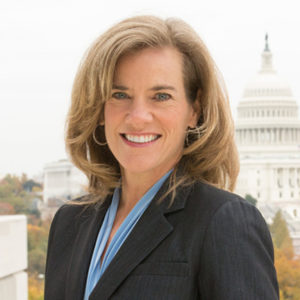Church/state watchdog groups including the Baptist Joint Committee urged the U.S. Supreme Court to agree that a dollar-for-dollar tax credit that diverts public funds to private Christian schools is unconstitutional in an upcoming case testing the balance between the First Amendment’s two clauses regarding religious liberty.
The BJC, a more than 80-year-old membership organization representing 14 state and national Baptist conventions and conferences across the country, and Americans United for Separation of Church and State joined other groups in separate friend-of-the-court briefs asking the Supreme Court to uphold a lower-court ruling that Montana’s program violates an article in the state’s constitution prohibiting aid to sectarian schools.

Holly Hollman
“The U.S. Supreme Court has never ruled that the Free Exercise Clause demands government funding of religion,” said BJC General Counsel Holly Hollman. “To do so would, in effect, re-write state constitutions and upend the way religious liberty is protected.”
Three low-income mothers relying on scholarships to keep their children in Stillwater Christian School, a nondenominational school in Kalispell, Montana, are asking the Supreme Court to settle once and for all whether the government may bar religious choices from generally available student-aid programs that are otherwise neutral.
They say state and federal courts have been splintered over the issue for nearly 25 years.
“Concluding that the Free Exercise Clause requires states to fund religious education whenever they fund secular education would be a radical departure from fundamental principles and long-standing precedent under the religion clauses,” said a brief filed by Americans United for Separation of Church and State and other civil-liberties and religious groups. “Although this court has, in some instances, permitted states to choose to fund religious education as part of a program of indirect aid, the court has never required that states do so.”
The Becket Fund for Religious Liberty, a non-profit that promotes the accommodation of religion in public life, claims in its brief that Montana’s no-aid clause is an example of a “Blaine Amendment,” named after a congressman who unsuccessfully tried to add similar language to the U.S. Constitution during a period of anti-Catholic animus in the latter half of the 19th century.
Because of the era’s “well-documented” nativist campaign against Catholic immigrants, Becket says, the Supreme Court should find Montana’s law and others like it “presumptively unconstitutional.”
The Baptist Joint Committee brief, meanwhile, states that there is no evidence that Montana’s constitution “was enacted out of religious animus” and that the high court should “respect the ability of states to guarantee greater protection of religious freedom” than those safeguarded by the First Amendment.
“Religious individuals and institutions, including religious schools, benefit from the law’s distinct treatment of religion,” Hollman said. “Both avoiding government sponsorship of religion and preventing government interference with religious practice are central elements of our country’s historic tradition protecting religious liberty.”
Oral arguments for the case, Espinoza v. Montana Department of Revenue, are scheduled Jan. 22.
